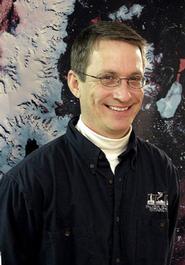
The published work of Eugene Domack, the Joel W. Johnson Family Professor of Geosciences, was cited in the recently released IPCC Climate Report, The Physical Science Basis, (Chapter 6 Palaeoclimate). The IPCC is the United Nations Intergovernmental Panel on Climate Change that issues state of the earth's climate reports based upon the recent scientific findings, greenhouse gas emissions and predictions for the future of the earth's climate. The final report of the organization was issued on November 17. Jonathan Overpeck '79 is a coordinating lead author for the Palaeoclimate chapter. A scientist at the University of Arizona, he was one of the international body of climate scientists who authored the first IPCC report.
The report is divided into several sections and Domack's article was cited several times as documenting the unprecedented changes in glacial cover now taking place under warming climates of the Antarctic Peninsula. In 2002 Hamilton College hosted an international workshop on the changes taking place in the Antarctic Peninsula region. Among the attendees were seven co-authors of the IPCC report, who recently shared the Nobel Prize with Hamilton's 2007 Sacerdote Series Great Names speaker Al Gore.
In October Hamilton was awarded two related grants from the National Science Foundation (NSF) that will continue to support the research of Domack and Assistant Professor of Biology Michael McCormick. Both grants will be applied to a series of research expeditions to Antarctica for which Domack will serve as chief scientist as part of the National Science Foundation (NSF) International Polar Year program.
Funding was granted for Domack's international, multi-year, collaborative research project, "Collaborative Research in IPY: Abrupt Environmental Change in the Larsen Ice Shelf System, a Multidisciplinary Approach - Marine and Quaternary Geosciences." His proposal received a $561,715 award that will allow him and a team of fellow researchers to address the changes occurring in the Antarctic Peninsula.
The report is divided into several sections and Domack's article was cited several times as documenting the unprecedented changes in glacial cover now taking place under warming climates of the Antarctic Peninsula. In 2002 Hamilton College hosted an international workshop on the changes taking place in the Antarctic Peninsula region. Among the attendees were seven co-authors of the IPCC report, who recently shared the Nobel Prize with Hamilton's 2007 Sacerdote Series Great Names speaker Al Gore.
In October Hamilton was awarded two related grants from the National Science Foundation (NSF) that will continue to support the research of Domack and Assistant Professor of Biology Michael McCormick. Both grants will be applied to a series of research expeditions to Antarctica for which Domack will serve as chief scientist as part of the National Science Foundation (NSF) International Polar Year program.
Funding was granted for Domack's international, multi-year, collaborative research project, "Collaborative Research in IPY: Abrupt Environmental Change in the Larsen Ice Shelf System, a Multidisciplinary Approach - Marine and Quaternary Geosciences." His proposal received a $561,715 award that will allow him and a team of fellow researchers to address the changes occurring in the Antarctic Peninsula.
Posted November 19, 2007
